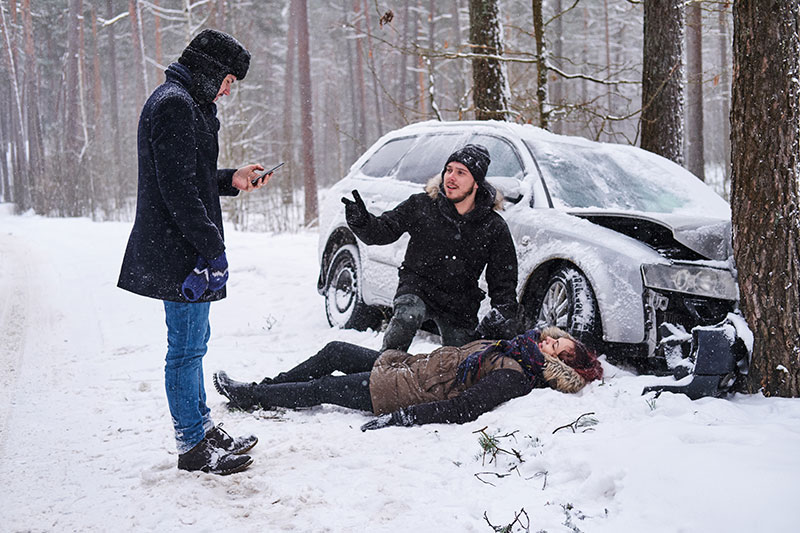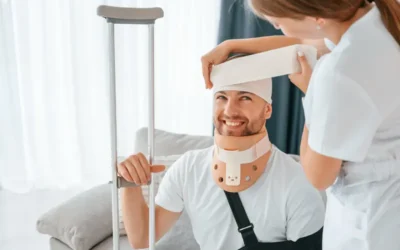Cold weather-related auto accidents mainly happen due to snow, slush or ice on pavements. Major factors that can cause dangerous road conditions include fog, sleet, black ice, high winds, and snowstorms. In winter weather conditions, visibility is reduced and roads may become slippery, leading to an increased risk of accidents. Icy roads are a frequent cause of accidents, resulting in numerous injuries and deaths each year. Snow and ice can lead to slower speeds, decreased roadway capacity, and a higher risk of crashes.
According to a report from the U.S. Department of Transportation, each year, 24% of weather-related vehicle crashes occur on snowy, slushy or icy pavements and 15% happen during snowfall or sleet. Over 1,300 people are killed and more than 116,800 people are injured in vehicle crashes on snowy, slushy or icy pavements annually. Zebra.com reports that Ohio has consistently ranked as the state with the most winter driving fatalities, averaging 86 deaths per year.
Factors that cause winter auto accidents include unplowed roads, unseen potholes, poor road maintenance, unsalted roads, ice flying off vehicles, and snow accumulation. Even though poor weather conditions may have contributed to the accident, the other driver still may have been negligent in causing the accident if he/she failed to act reasonably under the circumstances. Parties who are responsible for such accidents include negligent driver, or vehicle manufacturer.
Medical records provide the critical evidence to prove the nature of the injury and its extent. Attorneys can utilize professional medical review solutions to easily collect the key facts from the medical records.
Need comprehensive and accurate evaluation of medical records?
Contact MOS at (800)-670-2809 or click here to learn more about medical review services.
Liability in Winter-car Accidents
Some ice-related car accidents can be due to negligence from the drivers. In cases of negligence, key elements to prove include duty of care, breach of that duty of care, causation, and damages.
Although the driver may feel he/she was not negligent, there are many elements that may not be apparent to the driver when it comes to the cause of the accident.
There are several factors that could potentially determine responsibility for the accident, such as –
- driving at an inappropriate speed during cold weather conditions
- driving under the influence of drugs or alcohol
- following other vehicles too closely, driving while distracted
- failing to adequately maintain one’s vehicle
- engaging in reckless driving
- driving while fatigued
- driving without headlights
- driving without functional windshield wipers
Poor vehicle maintenance can be related to worn tires, poor brakes, lights not functioning, and ineffective windshield wipers.
Evidence to Prove Liability in Winter Weather Car Accidents
To prove the driver’s negligence, attorneys may require evidence such as –
Photographs
Photographs of the accident scene are crucial to develop the case. These include photos related to the injuries sustained, the condition of the vehicles involved and their damage, weather conditions, debris from the collision, skid marks or broken glass, snow fall, and any road defects or construction work that may have contributed to the accident. Also, attorneys may need all records related to car repairs and car rentals. Commercial vehicles often record black box data that tracks vehicle speeds and braking.
Medical records and medical bills
When it comes to collecting evidence in car accident cases, injury documentation could be very significant. Medical records collected will help to prove that the injuries sustained in the accident were the direct result of the defendant’s negligence. A complete copy of all the medical records, including x-rays, MRIs, emergency room records, hospitalization records, surgical records, medication prescriptions, and medical bills from each provider, can help to support the case.
Witness testimony
Collecting the names, addresses and contact details of the pedestrians in the area or the drivers of other vehicles who may have witnessed the crash and the events leading up to it will serve as good evidence to prove the case. The more people who can give firsthand accounts of what occurred at an accident scene, the easier it is to determine liability for damages. Eyewitnesses may be able to provide objective descriptions of precisely what they saw at the accident scene.
Police reports
A copy of the police report in a car accident case is key evidence in a car accident injury case. Upon arriving at an accident, a police officer will take note of all aspects of the scene. Reports prepared by police officers can include the location of relative vehicles, license plate numbers, injuries, interviews with witnesses, and discussions with those directly involved in the accident itself. This report also provides a comprehensive overview of the events before, during, and after an accident.
Medical record review companies can provide accurate review reports to the attorneys to help them build a strong foundation for the car accident case.
MOS’ medical record review process is customized to meet your specific requirements.




